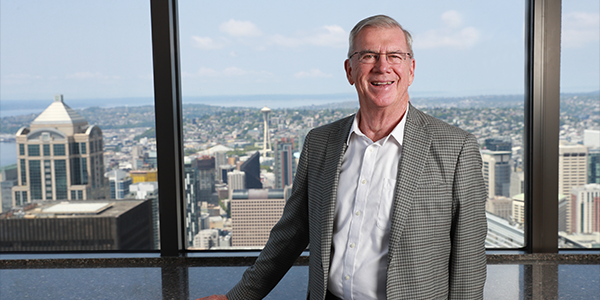Q & A with Joe Gaffney, '67

Joe Gaffney of Dorsey & Whitney's Tax and Estate Planning group is a trusted adviser to numerous families, closely held business owners, trusts and nonprofit organizations. A member of Seattle University's Board of Trustees, Joe also previously served as chair of Seattle U's Planned Giving Committee. In recognition of his leadership and expert counsel, we are pleased to share with you this interview.
SU: How does being Jesuit-educated inform your approach to working with clients on estate planning?
JG: It has a significant influence on the way I approach my work. What I do is integrative of personal values, relationships and healthy stances. It requires listening and understanding another's point of view and the ability to communicate effectively. It also requires capturing others' imaginations as to what can be, rather than what is right now.
SU: Has your experience on the SU Board of Trustees shaped your own giving?
JG: It's very humbling to see how effective Seattle U is, how worthy it is of receiving gifts, how well the assets are managed and how much the university needs money to serve its mission. I think the deeper you're involved, with an organization that is making a real difference, the more you want to give.
SU: What are some of the approaches you use to inspire your clients to think about their personal legacy and particularly any philanthropic legacy?
JG: My job is to help people implement their values, not to tell them what to do. I always ask clients if they've considered making gifts to charity. Most people's giving is not primarily motivated by tax savings. Although, it would be unusual for people with, say, $10 million or more in net worth to be uninterested in mitigating their taxes. Considering philanthropy can lead to some interesting discussions. Do you want your children to determine the recipients of your charitable giving? Do you want to decide? Have you considered setting up a private foundation with your kids? I've learned to be gentle when multiple generations of family members are involved in these decisions, because they may not all be on the same page.
Some clients need money to live on. They may want to give to charity, but they're also worried about future medical bills. For them, establishing a charitable remainder trust may offer the right solution. With this technique, you put money into a trust, receive a charitable tax deduction upon its establishment and keep the income generated by the trust. When both spouses have passed, the remaining balance goes to their charity of choice.
For people with appreciated stock that doesn't pay dividends, this can be a very good solution.
You put the stock into a charitable remainder trust, the stock gets sold and you can receive a monthly return as long as you live. If you set it up right, your return is a minimum of 5% and will increase as the trust increases in value. The Planned Giving group at Seattle U is very familiar with charitable remainder trusts and helps donors implement them.
SU: How do you talk with your clients about the concept of legacy?
JG: Personally, I think of legacy as my children and grandchildren carrying on values. It's living out of and being a part of the collective spirit.
There is legacy in family-the legacy of giving, the legacy of integrity, the legacy of fait h. Some families have a culture of philanthropy that's really healthy and carrying that on through a family foundation or a donor advised fund is a good thing.
SU: What gift planning tips would you offer to people at various stages of their lives?
JG: The first thing that comes to mind is get involved. It isn't so much about money. It's time, talent and money. Using your gifts for the greater good is so rewarding. Get involved with something that matters-something that's beyond yourself-with an organization or people you like. There's so much you can do that isn't around money, but will lead you to wanting to help in any way you can


